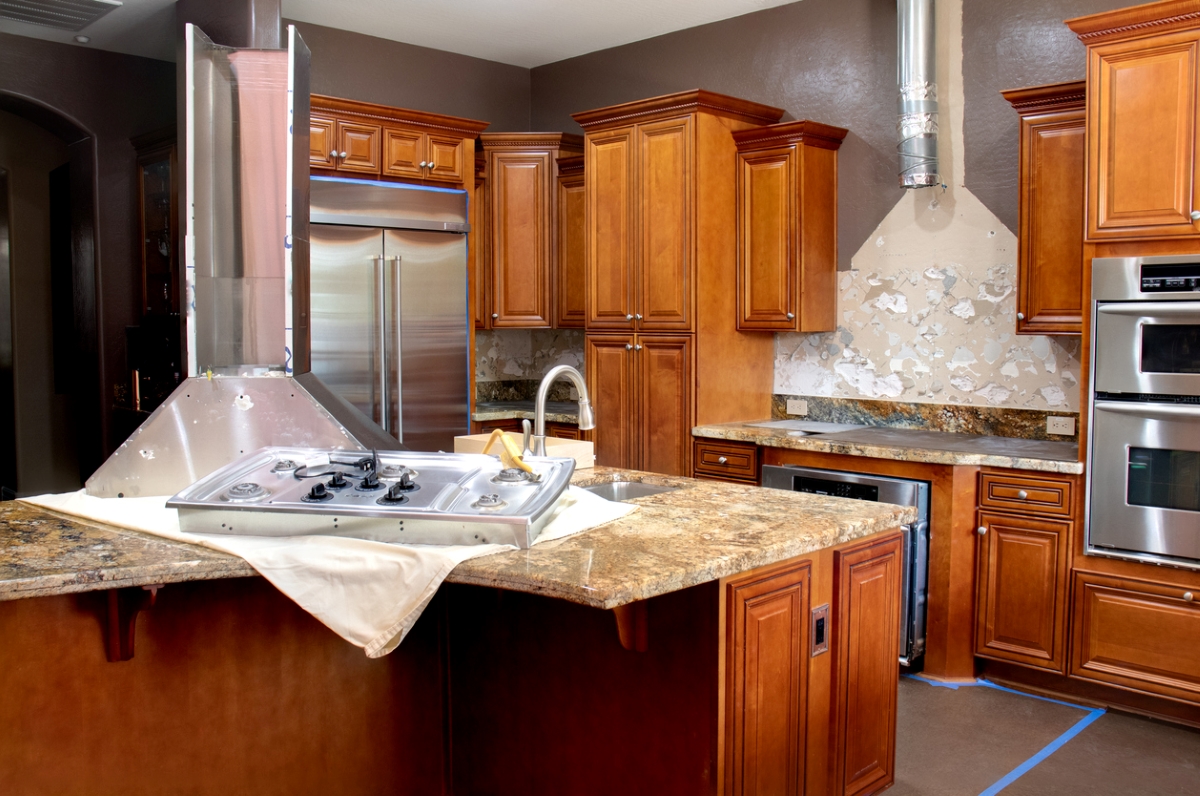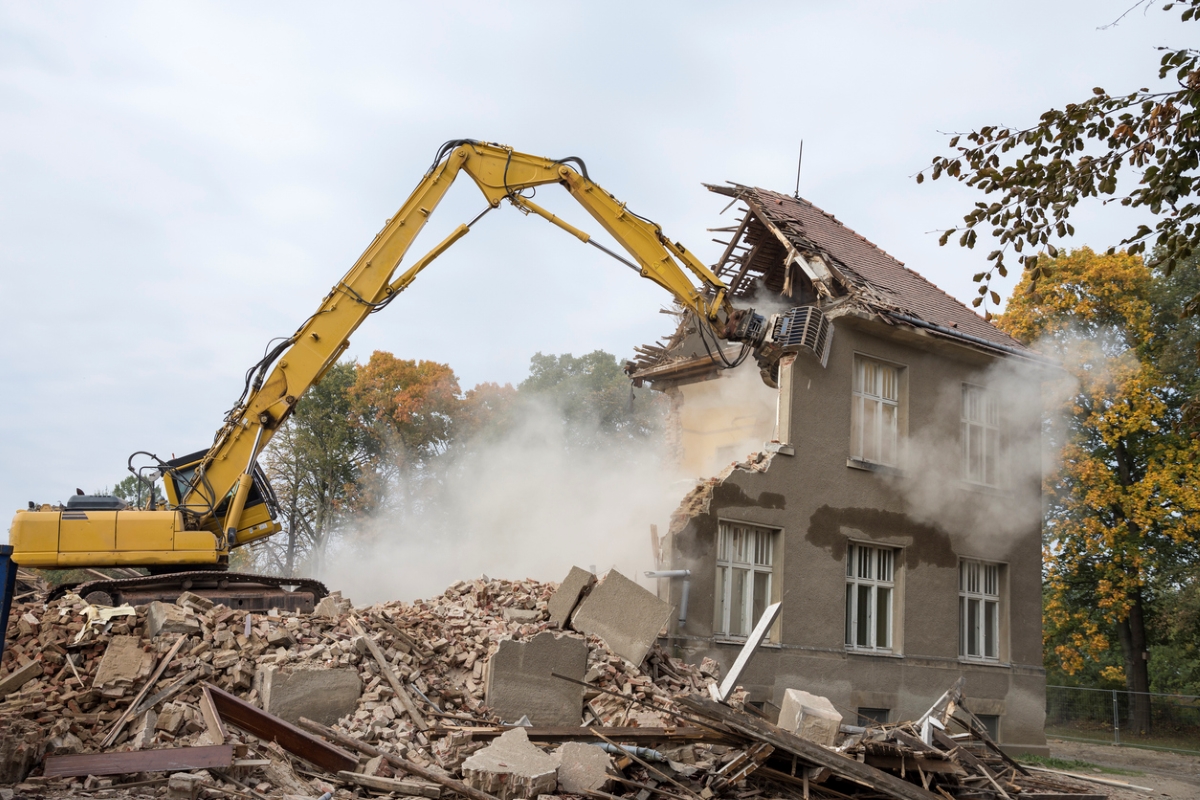

We may earn revenue from the products available on this page and participate in affiliate programs. Learn More ›
Auction estate sales, also known as demolition auctions, can unearth a treasure trove of bargain-priced deals, from Sub Zero refrigerators to stained glass windows and ornate railing spindles. However, these sales don’t necessarily have to occur at palatial estates. They can happen at Grandma’s split-level suburban home (though these often fall under the garage sale category), an old school, or a house of worship. If you intend to attend an auction estate sale, there are specific guidelines you will need to follow. Fail to do so, and you’re likely to leave empty-handed. Here’s everything you need to know.
1. What is a demolition estate sale?

A demolition sale is the sale of all the interior, and sometimes exterior, fixtures in a home before its demolition or a major remodel. It allows prospective homeowners to take possession of these fixtures, often for pennies on the dollar.
2. What kinds of things are sold in demolition auction sales?

Anything and everything that can be removed from the home is liable to be available for purchase in an auction estate sale. This includes appliances, light fixtures, ceiling fans, baths, toilets, sinks, flooring, moldings, mantels, doors, stair railings, and more.
3. How do I find out about them?

A Google search will show all the demolition estate sales in your area and beyond. The sites explain the bidding process for each auction. You can then sign up to be added to their mailing list for future sales. Although prospective buyers are rarely allowed inside a home before a demolition sale, websites usually have photos showing all the available fixtures.
For example, Maria and Greg Stanton, who run Green Circle Architectural Auctions in Greenwich, Connecticut, rely on a multi-channel approach to get the word out. “In addition to the platform’s advertising, we use social media,” Greg says. “There’s a lot of word of mouth in this business.”
4. Why do home sellers, builders, or auction sites have demolition estate sales?

Demolition auctions are a win-win. The demolition or construction company would otherwise have to demolish these fixtures as part of the razing of the home, as it would be too time-consuming to remove them. Thus, by selling them prior to tearing down the home, they can make some extra money, while recycling interiors that would have otherwise been lost. The buyer can buy coveted antique fixtures from old homes and new appliances for a fraction of the price they would pay in an antique store or from an appliance store.
“The environmental, sustainability aspect is a big attraction,” says Stanton. “Many of the fixtures in these homes are in great condition and have a lot of life left. If they weren’t salvaged, they would just end up in a landfill.”
5. How do I go about buying things in a demolition auction?

Usually, auction sites allow online bidding. However, for more exclusive or higher-priced properties, the auction is often held onsite at the property. Sometimes, a combination of both online and onsite bidding is allowed.
6. Auction sales are strictly DIY affairs.

If you see an item you like at an online auction sale, don’t expect the auctioneer to arrange shipping for you. You will have to arrange everything — the removal, pick-up and shipping. This is not Wayfair! That’s why it’s often best to attend an auction sale close to where you live to save on transportation/shipping costs.
7. How do demolition auctions help in my own home improvement?

These sites offer homeowners the chance to buy fixtures and fittings for a fraction of the price they would pay in retail outlets. This is why a demolition auction is sometimes referred to as a home improvement auction. In some cases, as with older homes, the antiques and fittings inside the home are no longer made and can either be used to add charm and character to a newer home or fit seamlessly into an older one as if they had always been there.
8. What tools should I bring to a demolition auction?

There are several ways the fixtures from a demolition house are accessed. Sometimes, a demolition auction company will hire a third-party company to remove these fixtures, which can then be picked up from the site. Mostly, though, buyers are responsible for safely extricating the items themselves.
The auctioneer will not allow just anyone to enter the premises and start hacking away at the fixtures they wish to buy. They will want to see a qualified handyman or salvage removal company equipped with the correct tools and transportation to expeditiously and safely extract and transport the items they have purchased. Fail to bring the right muscle and you could find yourself carrying heavy items alone. Auction items must be removed on the same day they are purchased. “It’s usually a case of in by 9 am, out by 4.30 pm,” says Stanton. “So people must work fast because we’re one step ahead of the bulldozers.”
Stanton uses “4-5 overseers to ensure everything is being removed safely.” He adds, “We don’t want to see a crystal chandelier get broken because someone doesn’t know what they’re doing.”
9. How do I find helpers?

You will need to hire removal crews according to the items being purchased. The removal and hauling away of luxury appliances requires a different skill set than antique moldings, stone fireplaces, oak flooring, or bluestone pavers. If you are removing electrical or plumbing items, many auctioneers insist that you use licensed handymen for those jobs, even if the electricity and plumbing in the house has already been disconnected. You can search for home salvage removal specialists available online, or the auctioneers may be able to make recommendations. “Because we see the same crews auction after auction, we can usually offer a good referral to help with the removal,” Stanton says.
10. What type of transport will I need?

Salvage removal companies have their own trucks and equipment for larger items. If you are hiring laborers to help lift heavy items that do not require specialist removal, you will need to hire the requisite type of transportation, as well. It is also prudent to check the type of insurance you might need, in case of injuries.
11. Remember all sales are final.

Make sure you know the measurements of the items you are purchasing and that they fit into your intended area because you will not be able to return them if they don’t. In fact, the house they were removed from may not even be there the following day.
